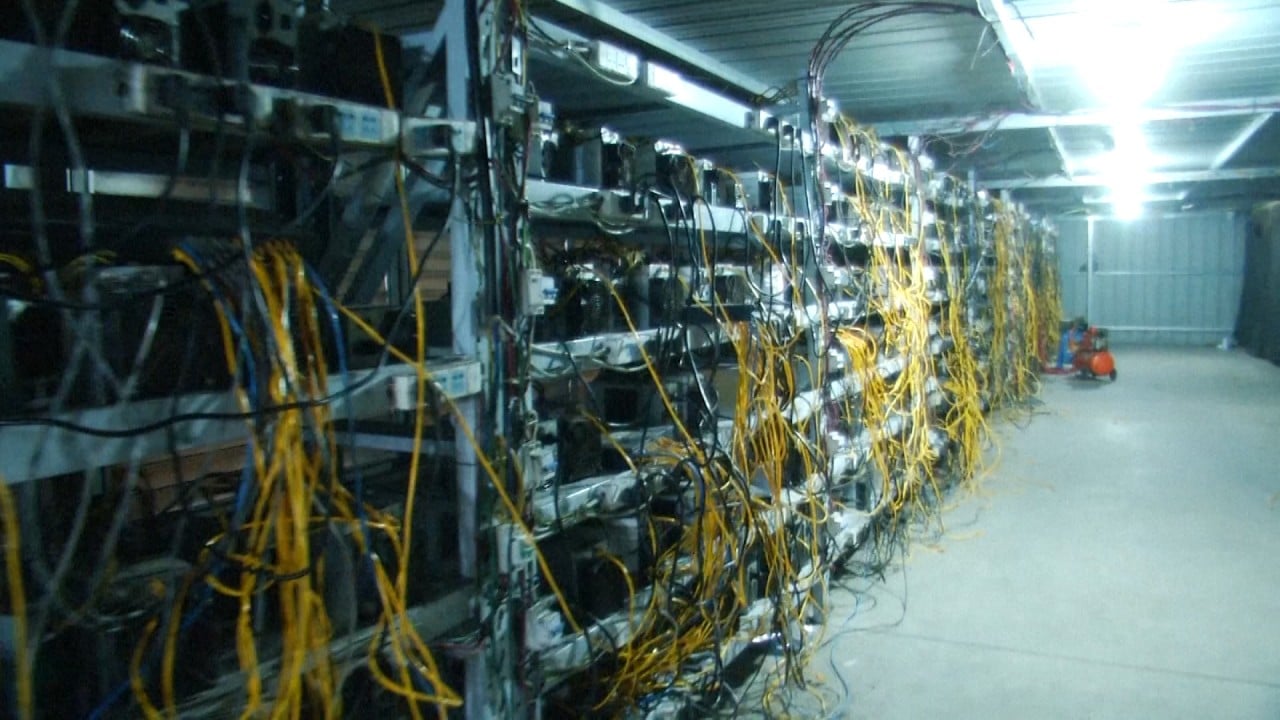
01:07
Chinese police seize 4,000 bitcoin-mining computers that illegally tapped US$3 million worth of electricity

Beijing’s city authorities have started an inquiry into the involvement of the capital’s data centre providers in cryptocurrency mining, a power-intensive operation that could undermine the nation’s efforts to reduce emissions.
The Beijing Municipal Bureau of Economy and Information Technology released on Tuesday an “emergency notice”, which was seen and confirmed by the South China Morning Post, asking data centre operators to report their participation in cryptocurrency mining, the amount of power consumed by these enterprises in the past year and its percentage amount to the total energy consumed by the data centre. The deadline was noon on Wednesday.
China’s three main telecommunications network operators, all of which operate data centres, also received the notice, according to an unnamed official cited in a Reuters report.
The Beijing bureau did not immediately respond to a request for comment on Thursday.
China Mobile, China Unicom and China Telecom also did not immediately respond to requests for comment.
Beijing’s inquiry comes amid China’s efforts to curb all high energy-consuming industries, fight pollution and reduce its carbon emissions.
The country, which is home to the world’s largest cryptocurrency farms, has pledged to halt the rise in its carbon emissions before 2030, and is committed to achieve carbon neutrality in 2060.
Pressure to meet China’s commitment has led to a plan by Inner Mongolia, China’s top province in terms of energy consumption, to suspend all new and existing cryptocurrency mining projects in a bid to meet its power-saving targets.
Cryptocurrency mining requires huge amounts of computing power and uses large amounts of energy, with most operations attracted to areas like Inner Mongolia, Sichuan and Xinjiang because of low electricity prices.
Beijing’s inquiry could be part of the central government’s broader plan to reduce carbon emissions, according to Nishant Sharma, founder and chief executive of BlocksBridge, a consulting firm focused on cryptocurrency mining.
He indicated, however, that the information requested by the city’s authorities are less comprehensive than the data being asked of data centre providers in Russia, which has seen a strong rise in cryptocurrency mining.
“[Beijing’s inquiry] covers only the data that is needed to better estimate the energy consumed by cryptocurrency mining in the region,” Sharma said.
In August last year, the Russian government proposed regulation that directs data centre operators to provide a wide range of information to help authorities assess their cryptocurrency mining activity.

Trading of bitcoin and other digital currencies has been banned in China since 2017 over fears that these pose a threat to financial markets. Cryptocurrency mining, however, has continued to flourish, thanks to cheap electricity and the recent increase in the value of bitcoin.
The annual energy consumption of China’s cryptocurrency miners is expected to peak in 2024 at about 297 terawatt-hours, greater than all the power consumption by Italy in 2016, according to a study published on Tuesday in the peer-reviewed journal Nature Communications. The authors include researchers from the University of the Chinese Academy of Sciences, Tsinghua University, Cornell University and the University of Surrey.
These mines’ annual carbon emissions are set to peak at 130 million tonnes in 2024, or more than the greenhouse gas emissions of the Czech Republic in 2016, the study said.
As of April last year, China accounted for more than 75 per cent of the world’s bitcoin mines, according to the research.
A new digital currency called Chia – created by Bram Cohen who is best known for developing the peer-to-peer BitTorrent protocol – promises to solve the energy consumption issue of cryptocurrency miners.
Chia mining uses hard drive storage instead of processing power. That development, however, has caused a run on hard disk and solid-state drives on the mainland in anticipation of a surge in demand for such storage devices used for mining.
Additional reporting by Che Pan.